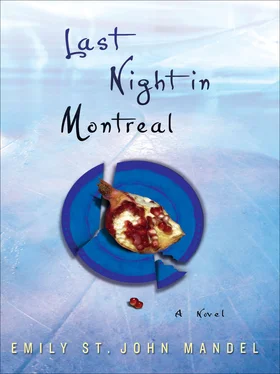There is a pay phone by a truck stop near the town of Leonard, Arizona. Sometimes at night it starts to ring.
Eli’s bed was the hull of a fishing boat. An antique figurehead had been mounted on the bow; in daylight she took the form of a woman rising out of foam, her eyes burning a path toward the north star and morning. Her hair had been painted the color of fire, her eyes a terrible and final blue. In her arms she held a fish: an hour by subway from the nearest ocean, it opened its gasping mouth to the sky.
Her eyes guarded the door to his bedroom, which had been painted like the entrance to a pirate’s cave, and he was grateful for her presence; in the first days after the hospital, his blood heavy with memory and sedatives, he felt too sick to be alone in the room. Nothing in the room, he found, was quite real. This had been the case since midchildhood, but it was more problematic these days than it had been. The walls were blue, and streaked with lighter and darker shades that made them look watery in certain lights. This effect had been noticed by his brother when they were nine and eleven, and they’d spent a few weeks painting desert islands and fish. Their mother, who had a great love of consistency, had installed the figurehead bed the following year. The room was a dreamish seascape, more amateurish in some places than in others; Zed, besides being two years older, was a better painter than Eli. In bad moments Eli thought he might be drowning, but he didn’t want to say anything or request a move to another bedroom. He felt bad about all the trouble everyone had already gone to.
It hadn’t been easy to retrieve him from Montreal; the hospital had lost his wallet. This was hardly unprecedented, but in this particular case it was unusually disastrous; with the wallet missing somewhere in the understaffed chaos of the emergency room and the patient in no mood to illuminate anyone, no one knew the patient’s name. The police liked to come by occasionally, particularly in the first few days, and ask leading questions from the chair next to the bed, alternating hopefully between English and French. The patient would reply in neither language and stared blankly or tearfully out the window instead.
In those days he existed in a state of profound distraction; he was deeply preoccupied with watching the same two nightmares playing over and over and over again on an agonizingly continuous loop. The first was a speeded-up version of his girlfriend leaving his apartment in Brooklyn. This had happened some time before he had arrived at the hospital, but the details remained brilliant: she stands before the sofa running her fingers through her still damp hair, she kisses him on the head for the third time that morning, she announces that she’s going for the paper, the door closes and he hears her footsteps going down the stairs. The other involved a train, a girl holding a crushed red cigarette box, and the brownish interior of the Métro Place-des-Arts subway station in downtown Montreal. He closes his eyes and sees the way the tightrope walker steps out into the empty air, sans tightrope, the way the small dark figure is suspended for an instant in front of the blue train until she falls and is lost in the thudding conspiracy of machinery and rails and heavy dark wheels, now slick. He fell down by the platform edge and this was where he was plucked from, later. He’d thought he heard Lilia’s voice. Later he woke in a pale blank room, unspeaking, and this was where he remained for weeks after the fact, lost in distraction while a succession of professionals passed through his hospital room. He was aware of them in flashes: the police officer who changed into a nurse, then a doctor, then a nice lady with a lump of clay for him to express himself with, then a chair. He couldn’t hear their questions over the din of the train, but the procession continued on looped replay (nurse, doctor, doctor, chair) until the morning when Zed walked into the room.
Eli wasn’t looking at the door; the fragile wintery light through the window had held his attention for hours. But (here, a sudden miracle) all at once Zed’s voice was in this room, in this city, and he turned his face toward it. He hadn’t seen his brother in a year and a half.
Zed was speaking rapidly in French to one nurse among several, his eyes never leaving Eli’s face and his voice brimming with impatience. Eli heard his own name repeated twice. Zed kept up a rapid monologue as he corralled a small crowd of concerned medical professionals toward the exit; with the phantoms safely exiled to the hallway, he closed the door, held it shut for a second lest anyone get any clever ideas, turned back to Eli, and finally smiled. He approached the bed, turned the chair around, and sat down sideways on it.
“Hello,” Eli said. This was, at least, the intent; after twenty-seven days without talking, it came out as a whispery croak. He swallowed.
“Eli. Good morning. Why wouldn’t you tell them your name?”
“I didn’t feel like talking,” Eli said, slightly more audibly.
Zed laughed quietly and went to the window. The low skyline was blurred by falling snow.
“I didn’t know you spoke French,” Eli said.
“I picked it up over the years.”
“I tried to jump after her.”
“I know. They told me,” his brother said.
“I’m always too late, Zed. I’m always just a beat too late.”
“Everyone’s too late sometimes.”
“Have you ever seen what a train does to a girl?”
Zed was silent for a moment, looking out the window.
“This place is dire,” he said finally. “I’m taking you home.”
What followed was a complicated, unbearable sequence, difficult to remember in detail later on. A red vinyl chair at an airport in Dorval, just outside the city of Montreal. A check-in counter on which he leaned heavily and stared at the floor. Wheelchairs had been offered. He insisted on walking through the airport but couldn’t remember what direction he was meant to be walking in for more than a minute; Zed, laden with luggage and worry, was forever seizing him by the elbow and realigning him. Eli had an odd way of walking: shuffling, tripful, stumbling over shadows on the smooth glossy floor.
A brief flight over a border in wintertime. The grey wing of a plane outside the window. The world glimpsed in barely remembered flashes of snow and air and the corners of buildings (memories of a dream he’d had once: snow, wartime, the vague impression of heroism, hiding in a ditch in the cold). The streets of Manhattan through the windows of a taxicab. (“At least it’s alive here,” he said to his brother, before he closed his eyes again. It was the first thing he’d said in four hours, and did nothing to reassure Zed.) Their mother reduced to a kind of concerned impression, insubstantial and far off, like a sketch of a mother drawn on transparent architect’s vellum. A door opening into the blue room where he’d slept as a child, assurances that he could rest here as long as he needed to and that everything was going to be all right, pajamas, the sound of worried voices out in the hallway afterward. He closed his eyes and went to sleep immediately.
In the first few days he didn’t move very much. He lay still on the bed watching light move across the ceiling. Later on the days assumed a particular rhythm: cadences of winter light in the clear afternoons, the white-and-black expanse of Central Park out the window of his mother’s apartment, white snow and silvery trees and dark paths winding between them — he could lose himself in this vision for hours on end. There were entire afternoons when life distilled into precisely this: a blue room on the Upper West Side and snow outside the window, his mother’s favorite Bach or Vivaldi playing quietly somewhere in another room and his mother humming tunelessly along with it, and people passing small and dark in the icy world below.
Читать дальше












